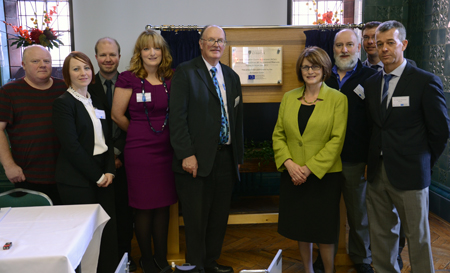Louise Ellman MP (fourth from right) with, from left: Technician, Alan Tidbury; Outreach Officers, Dr Kerry Abrams and Dr Tobias Heil; Centre Administrator, Lynn Allan; Centre Director, Professor Gordon Tatlock; Dr Tim Joyce; Thomas Boegelein and Technical and Industrial Liaison Manager, Dr Simon Romani
A centre to help companies access state of the art microscopy technology has been launched at the University of Liverpool by Louise Ellman, MP for Riverside, Liverpool.
The Nano Investigation Centre at Liverpool (NiCaL) will provide small and medium sized businesses in the region with free access to the latest microscopy instrumentation as well as support from experienced analysts and material scientists.
Funded by the European Regional Development Fund, NiCaL aims to help local companies improve their productivity and competitiveness by providing access to technology and expertise that will improve their product and process design.
Professor Gordon Tatlock, from the University’s School of Engineering and Director of NiCaL, said: “We have some of the world’s most advanced and powerful electron microscopy equipment which can benefit any company which fabricates a physical product. We offer free advice and support to eligible small and medium sized enterprises (SMEs) and will be hosting workshops to demonstrate how the technology can improve product design and processes. We hope this technology will help SMEs grow and hopefully create jobs.”
Louise Ellman, MP, said: “This is an important initiative which will enable local companies to benefit from the most up-to-date scientific knowledge. It is a great boost for our economy.”
NiCaL’s expertise will help companies with shorter development cycles for new products, improved failure analysis and make it easier to identify design problems earlier.
Electron microscopy can add value to the manufacture of nearly every physical product. It uses a focused beam of electrons in place of light, enabling samples to be magnified up to around 20 million times actual size without loss of definition. It has commercial applications across a range of sectors, including advanced manufacturing, bio-sciences, medical equipment manufacture, and environmental and energy technologies.
